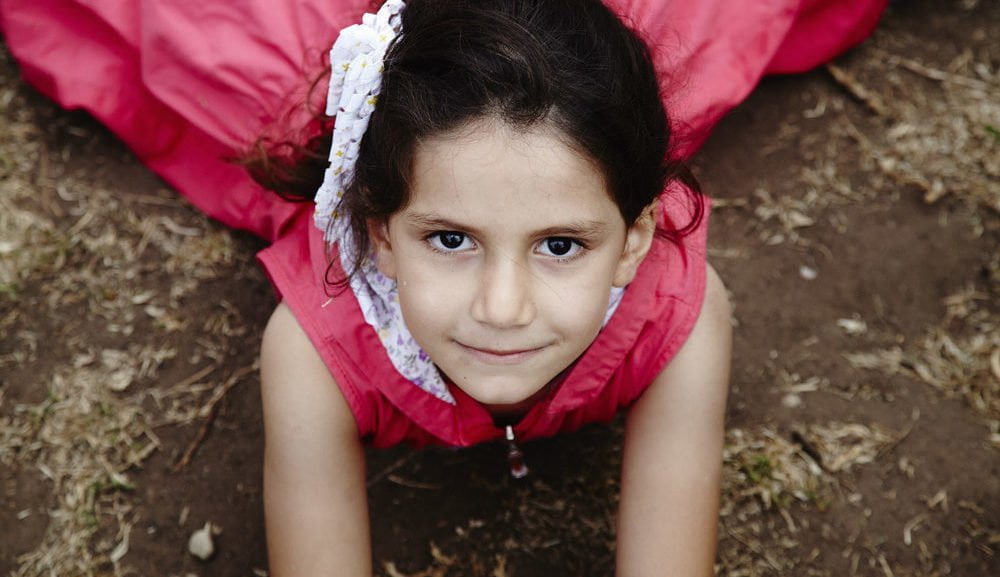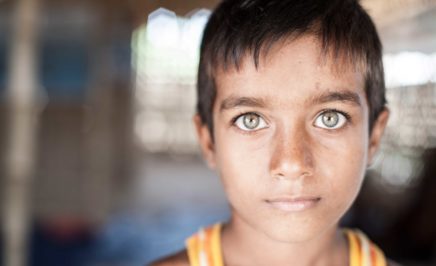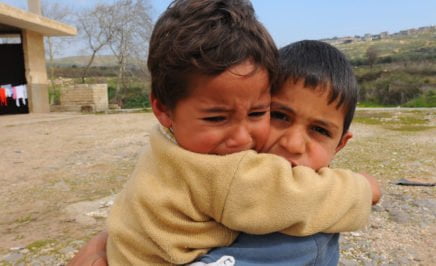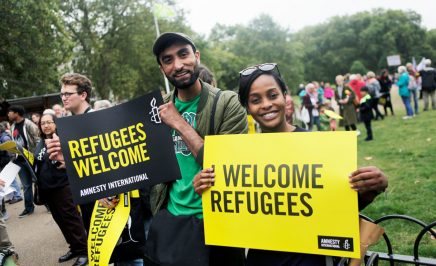A story of love and endurance; of fear and generosity; an intimate look at those at the centre of Australia’s refugee debate.
2014 poll indicated that 60% of Australians want our government to treat asylum seekers more harshly. But how many of the people who voted have ever actually met an asylum seeker?
Amnesty’s Katie Young did just that. She traveled to an outer Sydney suburb to visit the Abdalnasser (Abdal) and his family — Palestinian refugees who’ve had a rocky start to life in Australia.
During a routine catch-up with an immigration department official in June 2013, Abdal was told that he could no longer remain with his wife and children in their home in western Sydney. Without warning, he was transferred to Villawood Detention Centre.
It’s a story of love and endurance; of fear and generosity. And it’s an intimate look at what our support really means to those at the centre of Australia’s refugee debate.
Meeting the family
I’m standing on the doorstep of a suburban family home in Sydney’s west. I’m here to interview a refugee from Palestine as part of my work for Amnesty International.
A rush of footsteps and the door is opened by a shy teenage boy, soon surrounded by his brothers and sisters. Then the children’s father, Abdal appears with a smile on his face and an outstretched hand.
We’re ushered into the living room. The youngest children watch us curiously as we’re given a chilled glass of orange juice.
The room is full of smiles and I feel instantly welcome. But things weren’t always so rosy for this family.
The room is full of smiles and I feel instantly welcome. But things weren’t always so rosy for this family.
In 2014, Abdal was suddenly separated from his family and re-detained with no idea why. Amnesty Caseworker, Gabi McMahon, learned of Abdal’s situation and began advocating on his behalf.
The reason for our visit: to reunite Abdal and Gabi.
Years of uncertainty
Abdal and his family arrived in Australia by boat in June 2011.
They’ve been on the move a lot over the last 10 years. Living in Iraq when war broke out in 2003, they fled the country, spending time in a refugee camp before reaching Gaza, swapping one warzone for another.
The next six years were spent in the middle of a bloody conflict between rival Palestinian factions, Fatah and Hamas. The family saw rioting and violence from both sides, and many civilians killed.
Leaning forward in his chair, Abdal tells me, enough was enough. It was time to get his family to safety, whatever the cost. Initially, they sought asylum in Cyprus, but were forced to move on after 18 months.
“We lost hope of becoming refugees in Cyprus,” says Abdal. “The media portrayed us in a very negative light and people started to hate us. My daughters were attacked at their school by other children, who shouted ‘get out of this country’”.
“The media portrayed us in a very negative light and people started to hate us. My daughters were attacked at their school by other children, who shouted ‘get out of this country’.”
Abdal’s family had run out of options when they finally decided to make the treacherous journey to Australia.
“It was a very difficult decision to try to bring my family here by boat”, admits Abdal. “No one with even a little bit of logic would put seven children on the ocean if they have any other option.”
“No one with even a little bit of logic would put seven children on the ocean if they have any other option.”
Abdal
The family travelled via Malaysia to Indonesia, where they boarded a boat run by people smugglers.
“We went the long way and it took around eight days. Our other option was to go from Jakarta to Christmas Island, which took around one or two days, but that way was dangerous. We chose the long way because we could stay closer to shore and it was safer for the children.”
Arriving in Australia
With relief, the family finally reached Ashmore Reef, part of an external territory on the edge of north-west Australia.
“It was the happiest moment in all my life, seeing the Australian Navy. It meant we were alive.”
“It was the happiest moment in all my life, seeing the Australian Navy. It meant we were alive.” Abdal, a refugee and father
From there, the family was taken to Christmas Island. But, unknown to Abdal, Prime Minister Julia Gillard was on the verge of signing the Malaysia Deal, which would have seen them sent back to Malaysia.
“Julia Gillard signed the Malaysia Deal about a month and a half after we reached Christmas Island. But people who arrived before the day the deal was signed were sent to the mainland. It was a very great moment for.”
The family were detained briefly at Inverbrackie Detention Centre in South Australia, then settled in Adelaide and later, Sydney.
Re-detained
Abdal smiles as we listen to his children laughing and squealing in the back yard, but this life was hard-won.
In June 2013, after the family had relocated to Sydney and the children had begun to attend school, Abdal was suddenly re-detained.
During what he believed to be a routine catch up with an immigration department official at his home, Abdul was told that he could no longer remain living in the community. He would be taken to Villawood Detention Centre without his family, immediately. He had no idea why.
“I was shocked and my wife started crying,” he says, “They locked the door and three Serco guards came in.”
“It was horrible”, remembers Abdal’s 18-year-old daughter, “My younger brothers and sisters were crying and I told them not to worry because he would only be gone for one night. I told them he would be safe and he would be back, but we were so sad…I don’t want to even remember it.”
Meeting Gabi
“It [detention] was the worst period of my life”, says Abdal. “My life has been full of war. I can deal with anything, but not being separated from my family.”
“It [detention] was the worst period of my life”, says Abdal. “My life has been full of war. I can deal with anything, but not being separated from my family.” Abdal, a refugee and father
But things changed for the better when Abdal met Gabi, his Amnesty Caseworker.
“I had heard of Amnesty and when Gabi called I was very happy” he says, “Although I couldn’t understand why she was helping me…I wasn’t paying any money.”
Gabi, a 25-year-old University of New South Wales graduate with a Masters in Human Rights Law and Policy, became a caseworker at Amnesty in 2013.
“For me, it was an opportunity to provide help and support to asylum seekers on an individual basis as well as advocate for their rights on a wider level,” she explains.
“I find Australia’s current refugee policy extremely distressing, and while I can’t personally change this, I can give my time to ensure that people know they’re not alone.”
“I find Australia’s current refugee policy extremely distressing, and while I can’t personally change this, I can give my time to ensure that people know they’re not alone.” Gabi, an Amnesty Refugee Caseworker
Amnesty’s Casework Team supports asylum seekers at no cost. Their day-to-day work includes visiting asylum seekers in detention, organising referrals to various social services, and tracking cases to make sure people’s claims are being assessed fairly.
Although asylum seekers have told us that the most important things their caseworker provided were the intangible things — hope for a better life, the knowledge that someone cared and comfort in the fact they weren’t alone.
A helping hand
Gabi remembers being struck by Abdal’s positivity from the first moment.
“Abdal hadn’t been told why he’d been re-detained or what was going to happen next, but he fought hard to keep his spirits up,” she says.
During his time at Villawood, the two were in regular contact, with Gabi tracking Abdal’s case and keeping him informed.
“Gabi would email me and call me”, explains Abdal. “She would ask how I was and talk to me about my case. She did many things to help my situation”.
Gabi also followed up with Abdal’s family, who were struggling to cope without him.
“The youngest children would regularly wake up in the middle of the night crying out for their father”, remembers Abdal’s wife. “We wouldn’t have been able to bear the situation much longer, without it having a lasting impact”.
“The youngest children would regularly wake up in the middle of the night crying out for their father”, remembers Abdal’s wife. “We wouldn’t have been able to bear the situation much longer, without it having a lasting impact”.
Eventually, after three months, Abdal was released from detention and granted a protection visa.
He still doesn’t know why he was separated from his family or why he was released.
Life in Australia
Later in the evening, we sit down to a delicious dinner of rice and chicken, followed by a huge slab of passion fruit cake. Abdal makes me a cup of lemon and ginger tea. He calls it ‘garlic tea’, which makes us all laugh.
Despite the years of uncertainty and months in detention, Abdal and his family are thrilled to be living in Australia.
“You can’t imagine what it was like arriving in Australia,” says Abdal, beaming. “For us, it’s something like paradise. Now I can leave the house and not worry for my family.”
“You can’t imagine what it was like arriving in Australia. For us, it’s something like paradise. Now I can leave the house and not worry for my family.” Abdal
Although he admits that not all Australians are friendly towards asylum seekers, Abdal is convinced that the majority of people he’s met here have gone out of their way to help him and his family.
He still struggles to understand why someone like Gabi came to his aid.
“Why do people help us? I have asked myself this question a hundred times and I can’t find any answer, except that Australian people are humanitarians.”
Planning a future
Abdal has high hopes for the future.
He recently got his first job in Australia, as a bus driver doing the local school run, and he plans to pursue a career in community services.
“I’ve spent all my life working and studying,” he explains. “I have two Masters degrees and I want to support the community, I don’t want to be a drain on the community.”
Like all parents, their children’s education is important to Abdal and his wife, who has a degree in maths.
Despite the disruption at home in 2013, Abdal tells me, his eldest daughter achieved a score of 91.5 in her HSC and was the top-ranking NSW student in two subjects. She hopes to study chemistry at university.
While Abdal talks about his family, I notice that Gabi is smiling.
“It’s great to see how well Abdal and his family are doing despite the hardships they’ve faced,” she tells me later. “I’m just so happy for them.”
Support is vital
“It’s very difficult for people to imagine the situation that refugees and asylum seekers are in”, says Abdal, “but when you find people trying to support you, it really does help.”
“It’s very difficult for people to imagine the situation that refugees and asylum seekers are in, but when you find people trying to support you, it really does help.” Abdal
“People in this country still have that humanitarian kindness. I hope that Amnesty’s Casework Team can keep supporting people like me.”
Unfortunately, more and more people need Amnesty’s support these days.
The Australian Government’s refusal to resume normal processing means that 30,000 asylum seekers, including families like Abdal’s, now face soul-crushing indefinite detention.
I know that Amnesty’s caseworkers are being stretched thin. But, after meeting this family, I know it’s crucial they get the funds to continue their life-changing work in 2014.
Farewell
At 8pm, Gabi and I decide we should probably head home and let Abdal’s family get on with their evening.
We gather outside, laughing as we watch their beautiful six-year-old trying to walk in a pair of her mother’s shoes, and say our goodbyes.
Just before we turn out of the street I notice that the whole family is still in the driveway, waving us off.
They are good people. And they now have a chance to live the life for which they’ve fought so hard.
Article by Katie Young, Online Editor



